Small Business Entrepreneurship Assignment Report
VerifiedAdded on 2022/08/25
|12
|2831
|15
AI Summary
Contribute Materials
Your contribution can guide someone’s learning journey. Share your
documents today.

Running head: ENTREPRENEURSHIP AND SMALL BUSINESS
ENTREPRENEURSHIP AND SMALL BUSINESS
Name of the student
Name of the university
Author Note
ENTREPRENEURSHIP AND SMALL BUSINESS
Name of the student
Name of the university
Author Note
Secure Best Marks with AI Grader
Need help grading? Try our AI Grader for instant feedback on your assignments.
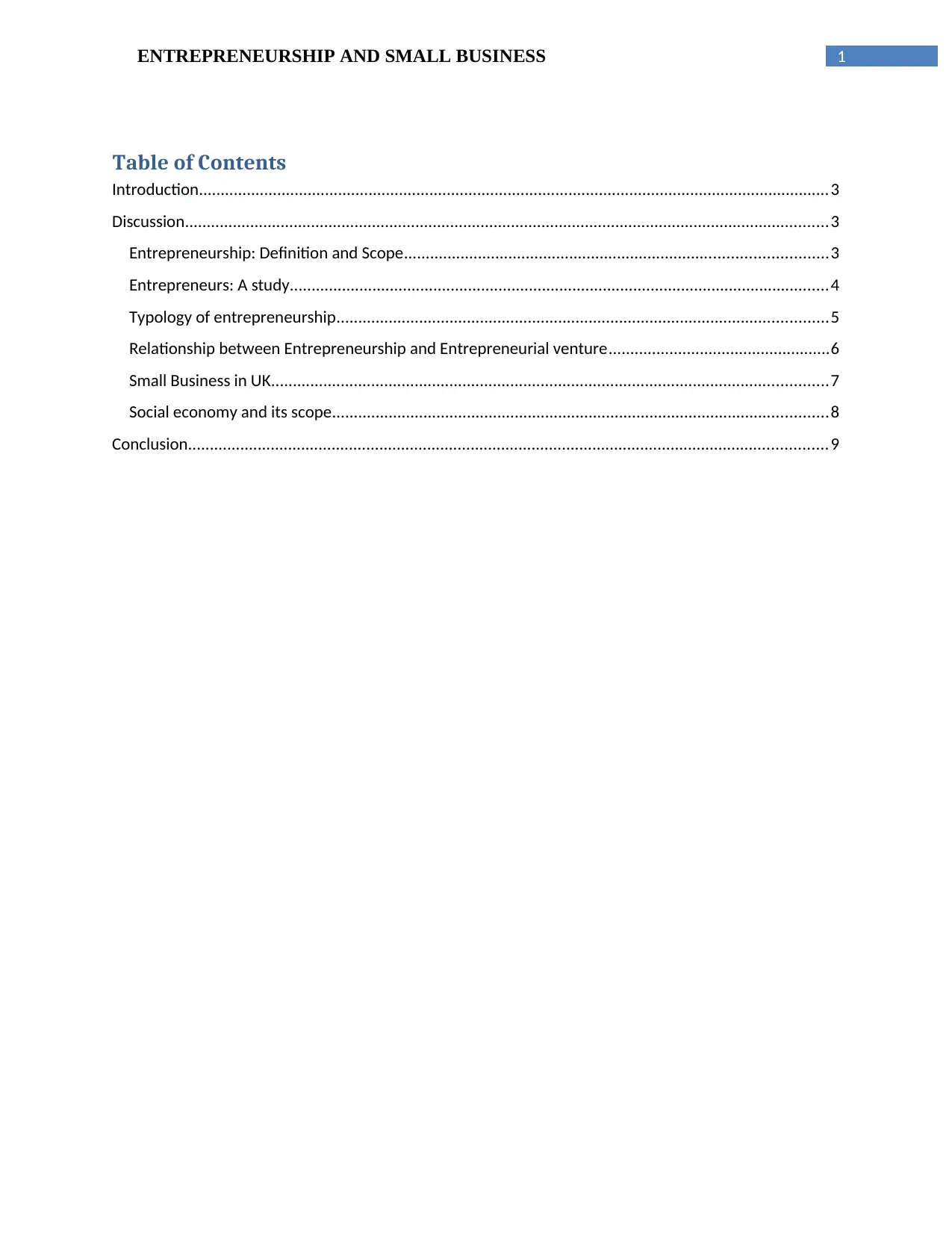
1ENTREPRENEURSHIP AND SMALL BUSINESS
Table of Contents
Introduction.................................................................................................................................................3
Discussion....................................................................................................................................................3
Entrepreneurship: Definition and Scope.................................................................................................3
Entrepreneurs: A study............................................................................................................................4
Typology of entrepreneurship.................................................................................................................5
Relationship between Entrepreneurship and Entrepreneurial venture...................................................6
Small Business in UK................................................................................................................................7
Social economy and its scope..................................................................................................................8
Conclusion...................................................................................................................................................9
Table of Contents
Introduction.................................................................................................................................................3
Discussion....................................................................................................................................................3
Entrepreneurship: Definition and Scope.................................................................................................3
Entrepreneurs: A study............................................................................................................................4
Typology of entrepreneurship.................................................................................................................5
Relationship between Entrepreneurship and Entrepreneurial venture...................................................6
Small Business in UK................................................................................................................................7
Social economy and its scope..................................................................................................................8
Conclusion...................................................................................................................................................9
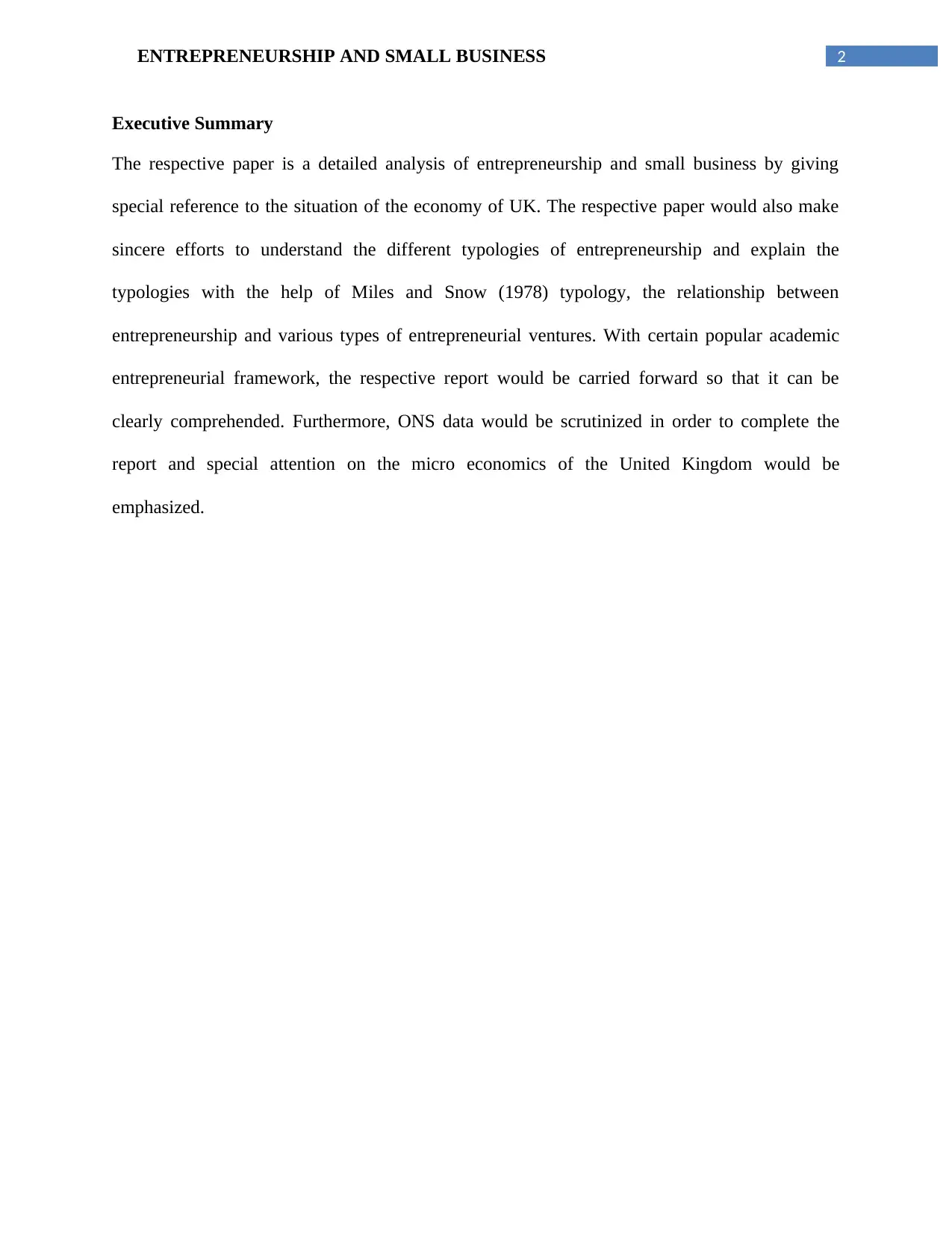
2ENTREPRENEURSHIP AND SMALL BUSINESS
Executive Summary
The respective paper is a detailed analysis of entrepreneurship and small business by giving
special reference to the situation of the economy of UK. The respective paper would also make
sincere efforts to understand the different typologies of entrepreneurship and explain the
typologies with the help of Miles and Snow (1978) typology, the relationship between
entrepreneurship and various types of entrepreneurial ventures. With certain popular academic
entrepreneurial framework, the respective report would be carried forward so that it can be
clearly comprehended. Furthermore, ONS data would be scrutinized in order to complete the
report and special attention on the micro economics of the United Kingdom would be
emphasized.
Executive Summary
The respective paper is a detailed analysis of entrepreneurship and small business by giving
special reference to the situation of the economy of UK. The respective paper would also make
sincere efforts to understand the different typologies of entrepreneurship and explain the
typologies with the help of Miles and Snow (1978) typology, the relationship between
entrepreneurship and various types of entrepreneurial ventures. With certain popular academic
entrepreneurial framework, the respective report would be carried forward so that it can be
clearly comprehended. Furthermore, ONS data would be scrutinized in order to complete the
report and special attention on the micro economics of the United Kingdom would be
emphasized.
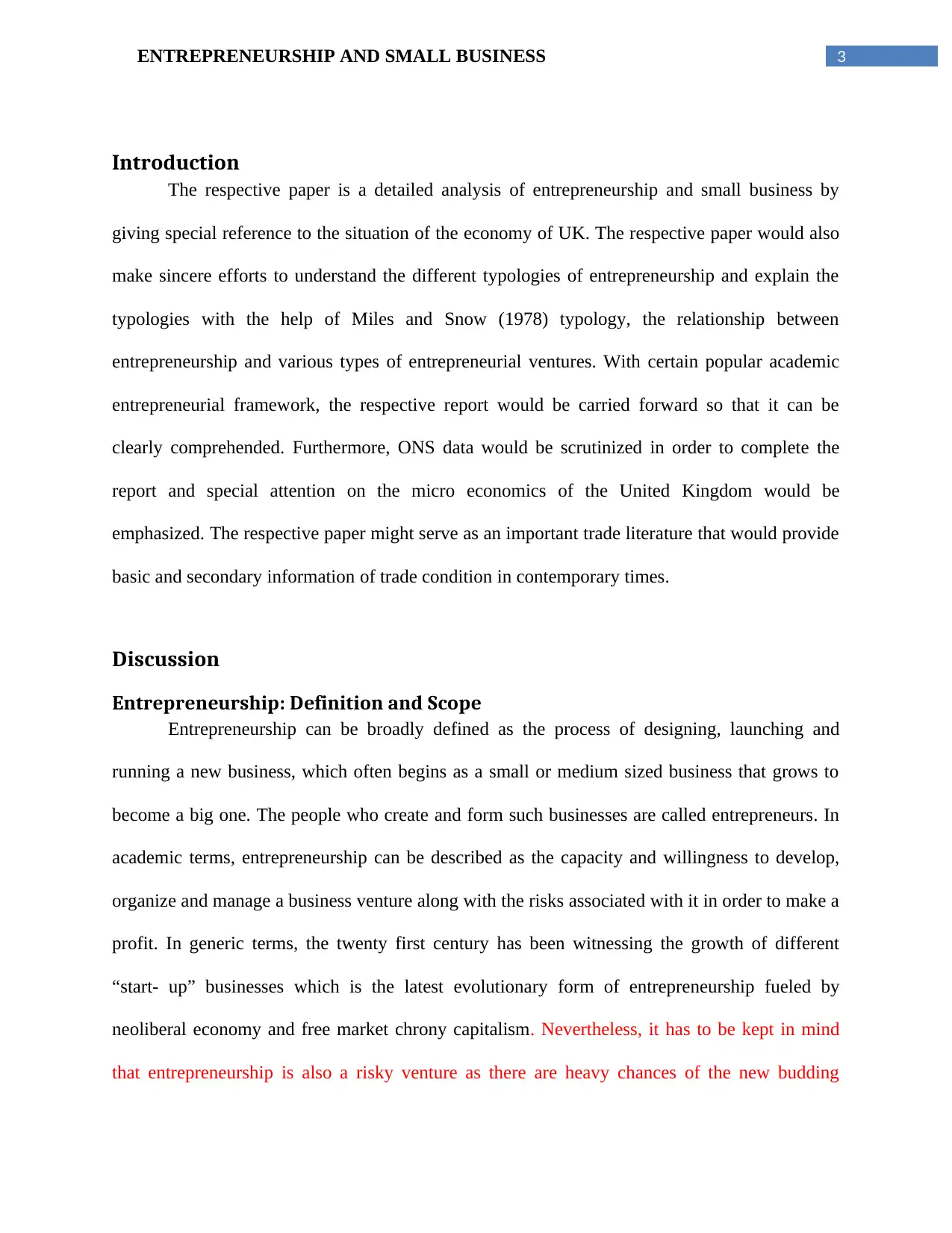
3ENTREPRENEURSHIP AND SMALL BUSINESS
Introduction
The respective paper is a detailed analysis of entrepreneurship and small business by
giving special reference to the situation of the economy of UK. The respective paper would also
make sincere efforts to understand the different typologies of entrepreneurship and explain the
typologies with the help of Miles and Snow (1978) typology, the relationship between
entrepreneurship and various types of entrepreneurial ventures. With certain popular academic
entrepreneurial framework, the respective report would be carried forward so that it can be
clearly comprehended. Furthermore, ONS data would be scrutinized in order to complete the
report and special attention on the micro economics of the United Kingdom would be
emphasized. The respective paper might serve as an important trade literature that would provide
basic and secondary information of trade condition in contemporary times.
Discussion
Entrepreneurship: Definition and Scope
Entrepreneurship can be broadly defined as the process of designing, launching and
running a new business, which often begins as a small or medium sized business that grows to
become a big one. The people who create and form such businesses are called entrepreneurs. In
academic terms, entrepreneurship can be described as the capacity and willingness to develop,
organize and manage a business venture along with the risks associated with it in order to make a
profit. In generic terms, the twenty first century has been witnessing the growth of different
“start- up” businesses which is the latest evolutionary form of entrepreneurship fueled by
neoliberal economy and free market chrony capitalism. Nevertheless, it has to be kept in mind
that entrepreneurship is also a risky venture as there are heavy chances of the new budding
Introduction
The respective paper is a detailed analysis of entrepreneurship and small business by
giving special reference to the situation of the economy of UK. The respective paper would also
make sincere efforts to understand the different typologies of entrepreneurship and explain the
typologies with the help of Miles and Snow (1978) typology, the relationship between
entrepreneurship and various types of entrepreneurial ventures. With certain popular academic
entrepreneurial framework, the respective report would be carried forward so that it can be
clearly comprehended. Furthermore, ONS data would be scrutinized in order to complete the
report and special attention on the micro economics of the United Kingdom would be
emphasized. The respective paper might serve as an important trade literature that would provide
basic and secondary information of trade condition in contemporary times.
Discussion
Entrepreneurship: Definition and Scope
Entrepreneurship can be broadly defined as the process of designing, launching and
running a new business, which often begins as a small or medium sized business that grows to
become a big one. The people who create and form such businesses are called entrepreneurs. In
academic terms, entrepreneurship can be described as the capacity and willingness to develop,
organize and manage a business venture along with the risks associated with it in order to make a
profit. In generic terms, the twenty first century has been witnessing the growth of different
“start- up” businesses which is the latest evolutionary form of entrepreneurship fueled by
neoliberal economy and free market chrony capitalism. Nevertheless, it has to be kept in mind
that entrepreneurship is also a risky venture as there are heavy chances of the new budding
Secure Best Marks with AI Grader
Need help grading? Try our AI Grader for instant feedback on your assignments.
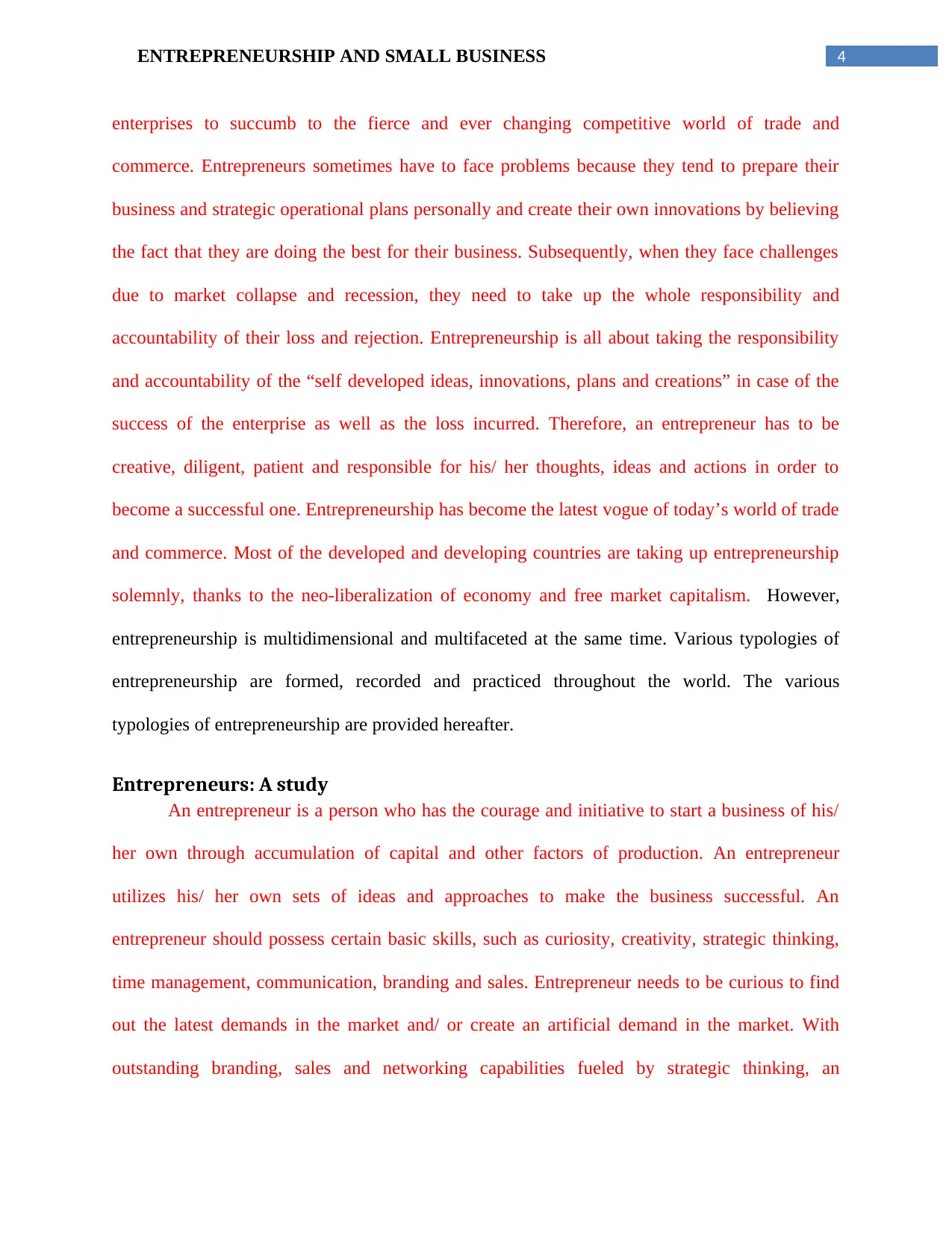
4ENTREPRENEURSHIP AND SMALL BUSINESS
enterprises to succumb to the fierce and ever changing competitive world of trade and
commerce. Entrepreneurs sometimes have to face problems because they tend to prepare their
business and strategic operational plans personally and create their own innovations by believing
the fact that they are doing the best for their business. Subsequently, when they face challenges
due to market collapse and recession, they need to take up the whole responsibility and
accountability of their loss and rejection. Entrepreneurship is all about taking the responsibility
and accountability of the “self developed ideas, innovations, plans and creations” in case of the
success of the enterprise as well as the loss incurred. Therefore, an entrepreneur has to be
creative, diligent, patient and responsible for his/ her thoughts, ideas and actions in order to
become a successful one. Entrepreneurship has become the latest vogue of today’s world of trade
and commerce. Most of the developed and developing countries are taking up entrepreneurship
solemnly, thanks to the neo-liberalization of economy and free market capitalism. However,
entrepreneurship is multidimensional and multifaceted at the same time. Various typologies of
entrepreneurship are formed, recorded and practiced throughout the world. The various
typologies of entrepreneurship are provided hereafter.
Entrepreneurs: A study
An entrepreneur is a person who has the courage and initiative to start a business of his/
her own through accumulation of capital and other factors of production. An entrepreneur
utilizes his/ her own sets of ideas and approaches to make the business successful. An
entrepreneur should possess certain basic skills, such as curiosity, creativity, strategic thinking,
time management, communication, branding and sales. Entrepreneur needs to be curious to find
out the latest demands in the market and/ or create an artificial demand in the market. With
outstanding branding, sales and networking capabilities fueled by strategic thinking, an
enterprises to succumb to the fierce and ever changing competitive world of trade and
commerce. Entrepreneurs sometimes have to face problems because they tend to prepare their
business and strategic operational plans personally and create their own innovations by believing
the fact that they are doing the best for their business. Subsequently, when they face challenges
due to market collapse and recession, they need to take up the whole responsibility and
accountability of their loss and rejection. Entrepreneurship is all about taking the responsibility
and accountability of the “self developed ideas, innovations, plans and creations” in case of the
success of the enterprise as well as the loss incurred. Therefore, an entrepreneur has to be
creative, diligent, patient and responsible for his/ her thoughts, ideas and actions in order to
become a successful one. Entrepreneurship has become the latest vogue of today’s world of trade
and commerce. Most of the developed and developing countries are taking up entrepreneurship
solemnly, thanks to the neo-liberalization of economy and free market capitalism. However,
entrepreneurship is multidimensional and multifaceted at the same time. Various typologies of
entrepreneurship are formed, recorded and practiced throughout the world. The various
typologies of entrepreneurship are provided hereafter.
Entrepreneurs: A study
An entrepreneur is a person who has the courage and initiative to start a business of his/
her own through accumulation of capital and other factors of production. An entrepreneur
utilizes his/ her own sets of ideas and approaches to make the business successful. An
entrepreneur should possess certain basic skills, such as curiosity, creativity, strategic thinking,
time management, communication, branding and sales. Entrepreneur needs to be curious to find
out the latest demands in the market and/ or create an artificial demand in the market. With
outstanding branding, sales and networking capabilities fueled by strategic thinking, an
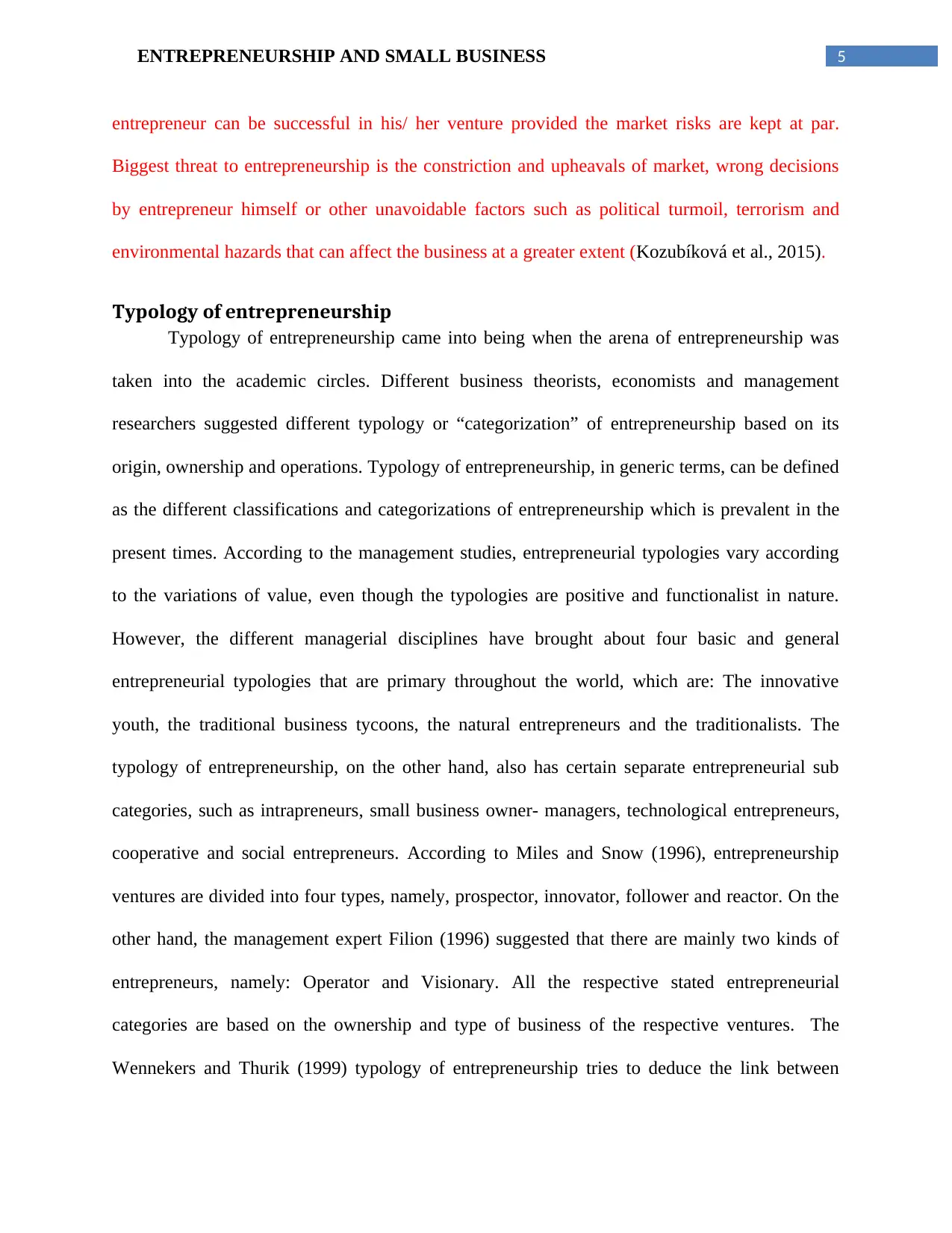
5ENTREPRENEURSHIP AND SMALL BUSINESS
entrepreneur can be successful in his/ her venture provided the market risks are kept at par.
Biggest threat to entrepreneurship is the constriction and upheavals of market, wrong decisions
by entrepreneur himself or other unavoidable factors such as political turmoil, terrorism and
environmental hazards that can affect the business at a greater extent (Kozubíková et al., 2015).
Typology of entrepreneurship
Typology of entrepreneurship came into being when the arena of entrepreneurship was
taken into the academic circles. Different business theorists, economists and management
researchers suggested different typology or “categorization” of entrepreneurship based on its
origin, ownership and operations. Typology of entrepreneurship, in generic terms, can be defined
as the different classifications and categorizations of entrepreneurship which is prevalent in the
present times. According to the management studies, entrepreneurial typologies vary according
to the variations of value, even though the typologies are positive and functionalist in nature.
However, the different managerial disciplines have brought about four basic and general
entrepreneurial typologies that are primary throughout the world, which are: The innovative
youth, the traditional business tycoons, the natural entrepreneurs and the traditionalists. The
typology of entrepreneurship, on the other hand, also has certain separate entrepreneurial sub
categories, such as intrapreneurs, small business owner- managers, technological entrepreneurs,
cooperative and social entrepreneurs. According to Miles and Snow (1996), entrepreneurship
ventures are divided into four types, namely, prospector, innovator, follower and reactor. On the
other hand, the management expert Filion (1996) suggested that there are mainly two kinds of
entrepreneurs, namely: Operator and Visionary. All the respective stated entrepreneurial
categories are based on the ownership and type of business of the respective ventures. The
Wennekers and Thurik (1999) typology of entrepreneurship tries to deduce the link between
entrepreneur can be successful in his/ her venture provided the market risks are kept at par.
Biggest threat to entrepreneurship is the constriction and upheavals of market, wrong decisions
by entrepreneur himself or other unavoidable factors such as political turmoil, terrorism and
environmental hazards that can affect the business at a greater extent (Kozubíková et al., 2015).
Typology of entrepreneurship
Typology of entrepreneurship came into being when the arena of entrepreneurship was
taken into the academic circles. Different business theorists, economists and management
researchers suggested different typology or “categorization” of entrepreneurship based on its
origin, ownership and operations. Typology of entrepreneurship, in generic terms, can be defined
as the different classifications and categorizations of entrepreneurship which is prevalent in the
present times. According to the management studies, entrepreneurial typologies vary according
to the variations of value, even though the typologies are positive and functionalist in nature.
However, the different managerial disciplines have brought about four basic and general
entrepreneurial typologies that are primary throughout the world, which are: The innovative
youth, the traditional business tycoons, the natural entrepreneurs and the traditionalists. The
typology of entrepreneurship, on the other hand, also has certain separate entrepreneurial sub
categories, such as intrapreneurs, small business owner- managers, technological entrepreneurs,
cooperative and social entrepreneurs. According to Miles and Snow (1996), entrepreneurship
ventures are divided into four types, namely, prospector, innovator, follower and reactor. On the
other hand, the management expert Filion (1996) suggested that there are mainly two kinds of
entrepreneurs, namely: Operator and Visionary. All the respective stated entrepreneurial
categories are based on the ownership and type of business of the respective ventures. The
Wennekers and Thurik (1999) typology of entrepreneurship tries to deduce the link between
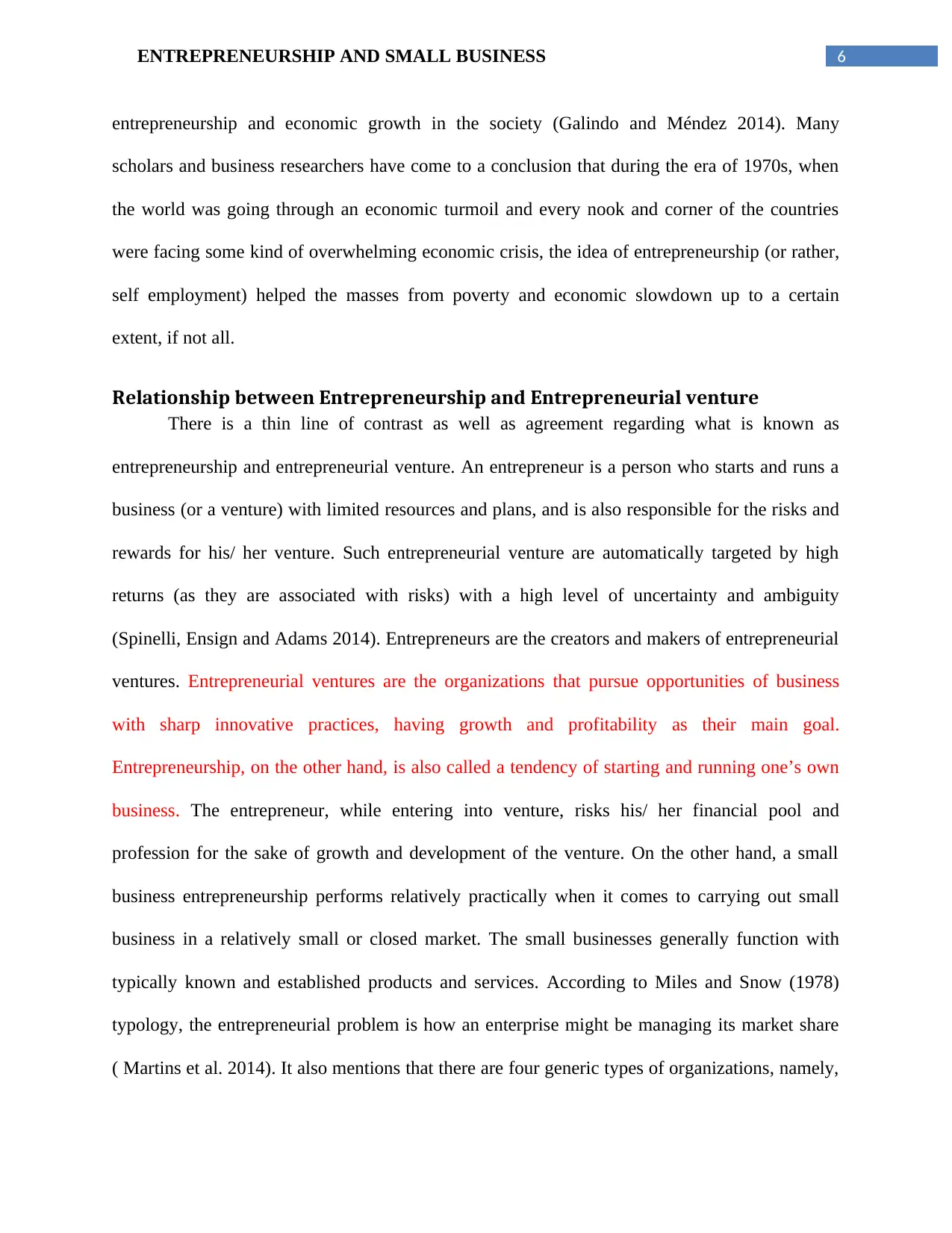
6ENTREPRENEURSHIP AND SMALL BUSINESS
entrepreneurship and economic growth in the society (Galindo and Méndez 2014). Many
scholars and business researchers have come to a conclusion that during the era of 1970s, when
the world was going through an economic turmoil and every nook and corner of the countries
were facing some kind of overwhelming economic crisis, the idea of entrepreneurship (or rather,
self employment) helped the masses from poverty and economic slowdown up to a certain
extent, if not all.
Relationship between Entrepreneurship and Entrepreneurial venture
There is a thin line of contrast as well as agreement regarding what is known as
entrepreneurship and entrepreneurial venture. An entrepreneur is a person who starts and runs a
business (or a venture) with limited resources and plans, and is also responsible for the risks and
rewards for his/ her venture. Such entrepreneurial venture are automatically targeted by high
returns (as they are associated with risks) with a high level of uncertainty and ambiguity
(Spinelli, Ensign and Adams 2014). Entrepreneurs are the creators and makers of entrepreneurial
ventures. Entrepreneurial ventures are the organizations that pursue opportunities of business
with sharp innovative practices, having growth and profitability as their main goal.
Entrepreneurship, on the other hand, is also called a tendency of starting and running one’s own
business. The entrepreneur, while entering into venture, risks his/ her financial pool and
profession for the sake of growth and development of the venture. On the other hand, a small
business entrepreneurship performs relatively practically when it comes to carrying out small
business in a relatively small or closed market. The small businesses generally function with
typically known and established products and services. According to Miles and Snow (1978)
typology, the entrepreneurial problem is how an enterprise might be managing its market share
( Martins et al. 2014). It also mentions that there are four generic types of organizations, namely,
entrepreneurship and economic growth in the society (Galindo and Méndez 2014). Many
scholars and business researchers have come to a conclusion that during the era of 1970s, when
the world was going through an economic turmoil and every nook and corner of the countries
were facing some kind of overwhelming economic crisis, the idea of entrepreneurship (or rather,
self employment) helped the masses from poverty and economic slowdown up to a certain
extent, if not all.
Relationship between Entrepreneurship and Entrepreneurial venture
There is a thin line of contrast as well as agreement regarding what is known as
entrepreneurship and entrepreneurial venture. An entrepreneur is a person who starts and runs a
business (or a venture) with limited resources and plans, and is also responsible for the risks and
rewards for his/ her venture. Such entrepreneurial venture are automatically targeted by high
returns (as they are associated with risks) with a high level of uncertainty and ambiguity
(Spinelli, Ensign and Adams 2014). Entrepreneurs are the creators and makers of entrepreneurial
ventures. Entrepreneurial ventures are the organizations that pursue opportunities of business
with sharp innovative practices, having growth and profitability as their main goal.
Entrepreneurship, on the other hand, is also called a tendency of starting and running one’s own
business. The entrepreneur, while entering into venture, risks his/ her financial pool and
profession for the sake of growth and development of the venture. On the other hand, a small
business entrepreneurship performs relatively practically when it comes to carrying out small
business in a relatively small or closed market. The small businesses generally function with
typically known and established products and services. According to Miles and Snow (1978)
typology, the entrepreneurial problem is how an enterprise might be managing its market share
( Martins et al. 2014). It also mentions that there are four generic types of organizations, namely,
Paraphrase This Document
Need a fresh take? Get an instant paraphrase of this document with our AI Paraphraser
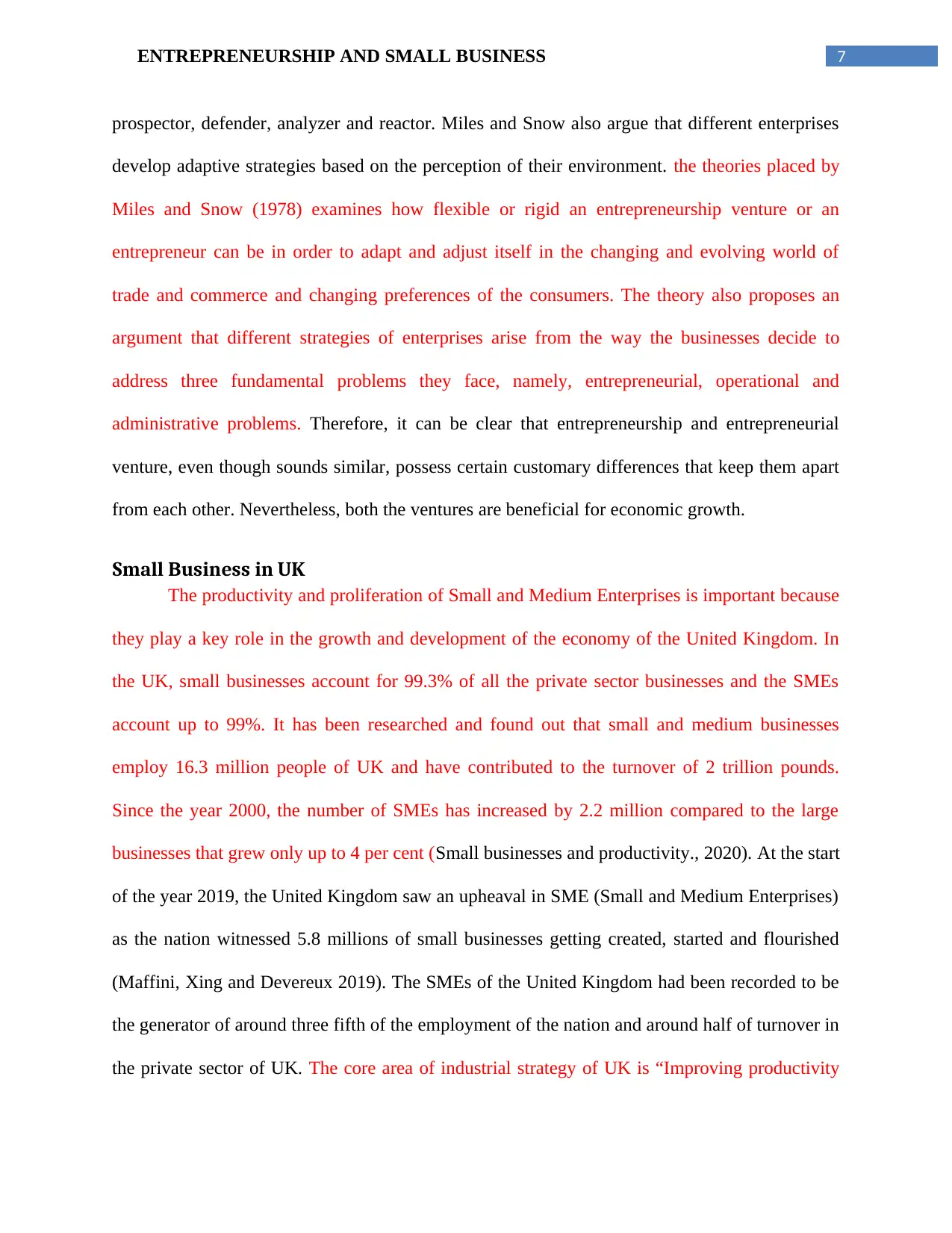
7ENTREPRENEURSHIP AND SMALL BUSINESS
prospector, defender, analyzer and reactor. Miles and Snow also argue that different enterprises
develop adaptive strategies based on the perception of their environment. the theories placed by
Miles and Snow (1978) examines how flexible or rigid an entrepreneurship venture or an
entrepreneur can be in order to adapt and adjust itself in the changing and evolving world of
trade and commerce and changing preferences of the consumers. The theory also proposes an
argument that different strategies of enterprises arise from the way the businesses decide to
address three fundamental problems they face, namely, entrepreneurial, operational and
administrative problems. Therefore, it can be clear that entrepreneurship and entrepreneurial
venture, even though sounds similar, possess certain customary differences that keep them apart
from each other. Nevertheless, both the ventures are beneficial for economic growth.
Small Business in UK
The productivity and proliferation of Small and Medium Enterprises is important because
they play a key role in the growth and development of the economy of the United Kingdom. In
the UK, small businesses account for 99.3% of all the private sector businesses and the SMEs
account up to 99%. It has been researched and found out that small and medium businesses
employ 16.3 million people of UK and have contributed to the turnover of 2 trillion pounds.
Since the year 2000, the number of SMEs has increased by 2.2 million compared to the large
businesses that grew only up to 4 per cent (Small businesses and productivity., 2020). At the start
of the year 2019, the United Kingdom saw an upheaval in SME (Small and Medium Enterprises)
as the nation witnessed 5.8 millions of small businesses getting created, started and flourished
(Maffini, Xing and Devereux 2019). The SMEs of the United Kingdom had been recorded to be
the generator of around three fifth of the employment of the nation and around half of turnover in
the private sector of UK. The core area of industrial strategy of UK is “Improving productivity
prospector, defender, analyzer and reactor. Miles and Snow also argue that different enterprises
develop adaptive strategies based on the perception of their environment. the theories placed by
Miles and Snow (1978) examines how flexible or rigid an entrepreneurship venture or an
entrepreneur can be in order to adapt and adjust itself in the changing and evolving world of
trade and commerce and changing preferences of the consumers. The theory also proposes an
argument that different strategies of enterprises arise from the way the businesses decide to
address three fundamental problems they face, namely, entrepreneurial, operational and
administrative problems. Therefore, it can be clear that entrepreneurship and entrepreneurial
venture, even though sounds similar, possess certain customary differences that keep them apart
from each other. Nevertheless, both the ventures are beneficial for economic growth.
Small Business in UK
The productivity and proliferation of Small and Medium Enterprises is important because
they play a key role in the growth and development of the economy of the United Kingdom. In
the UK, small businesses account for 99.3% of all the private sector businesses and the SMEs
account up to 99%. It has been researched and found out that small and medium businesses
employ 16.3 million people of UK and have contributed to the turnover of 2 trillion pounds.
Since the year 2000, the number of SMEs has increased by 2.2 million compared to the large
businesses that grew only up to 4 per cent (Small businesses and productivity., 2020). At the start
of the year 2019, the United Kingdom saw an upheaval in SME (Small and Medium Enterprises)
as the nation witnessed 5.8 millions of small businesses getting created, started and flourished
(Maffini, Xing and Devereux 2019). The SMEs of the United Kingdom had been recorded to be
the generator of around three fifth of the employment of the nation and around half of turnover in
the private sector of UK. The core area of industrial strategy of UK is “Improving productivity
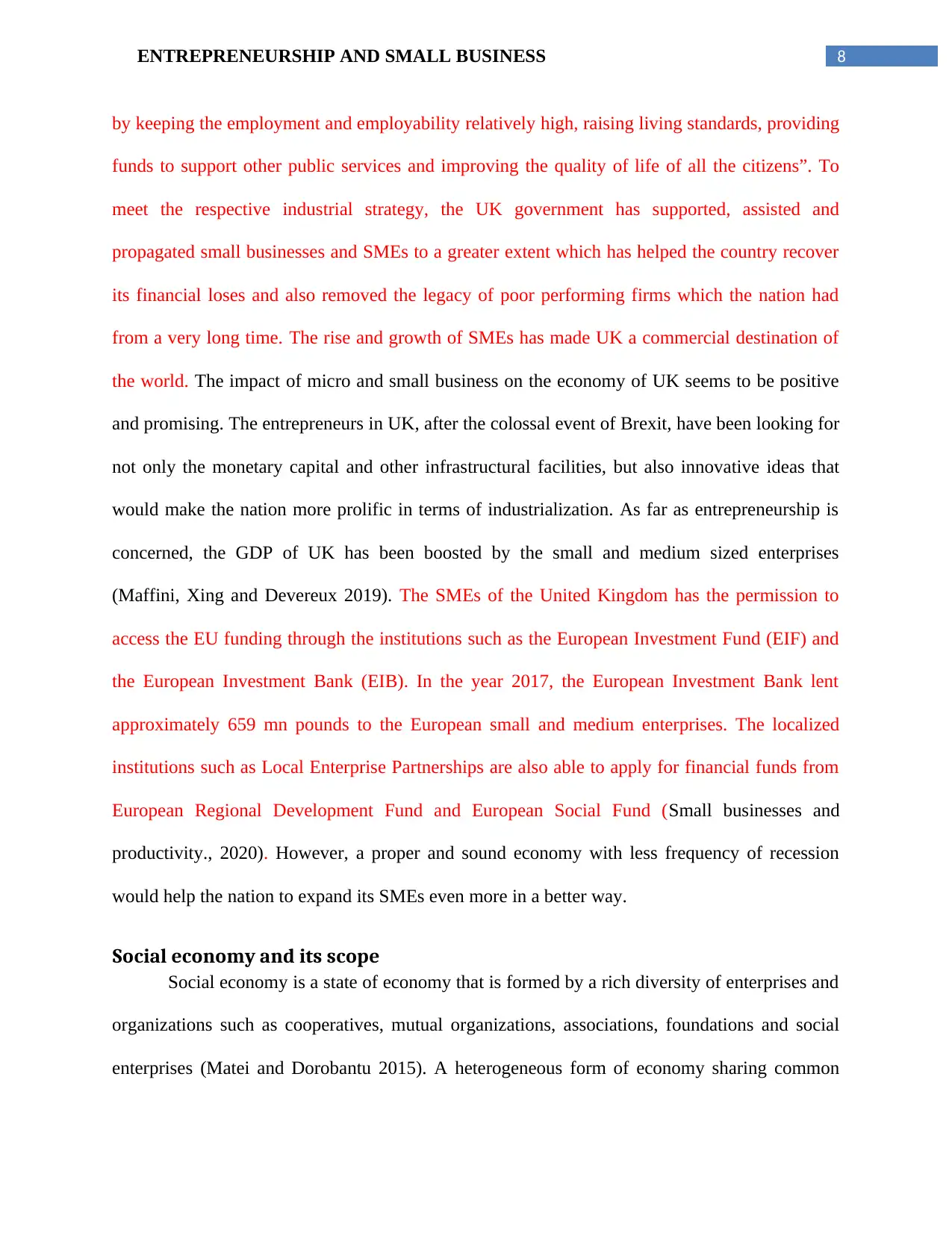
8ENTREPRENEURSHIP AND SMALL BUSINESS
by keeping the employment and employability relatively high, raising living standards, providing
funds to support other public services and improving the quality of life of all the citizens”. To
meet the respective industrial strategy, the UK government has supported, assisted and
propagated small businesses and SMEs to a greater extent which has helped the country recover
its financial loses and also removed the legacy of poor performing firms which the nation had
from a very long time. The rise and growth of SMEs has made UK a commercial destination of
the world. The impact of micro and small business on the economy of UK seems to be positive
and promising. The entrepreneurs in UK, after the colossal event of Brexit, have been looking for
not only the monetary capital and other infrastructural facilities, but also innovative ideas that
would make the nation more prolific in terms of industrialization. As far as entrepreneurship is
concerned, the GDP of UK has been boosted by the small and medium sized enterprises
(Maffini, Xing and Devereux 2019). The SMEs of the United Kingdom has the permission to
access the EU funding through the institutions such as the European Investment Fund (EIF) and
the European Investment Bank (EIB). In the year 2017, the European Investment Bank lent
approximately 659 mn pounds to the European small and medium enterprises. The localized
institutions such as Local Enterprise Partnerships are also able to apply for financial funds from
European Regional Development Fund and European Social Fund (Small businesses and
productivity., 2020). However, a proper and sound economy with less frequency of recession
would help the nation to expand its SMEs even more in a better way.
Social economy and its scope
Social economy is a state of economy that is formed by a rich diversity of enterprises and
organizations such as cooperatives, mutual organizations, associations, foundations and social
enterprises (Matei and Dorobantu 2015). A heterogeneous form of economy sharing common
by keeping the employment and employability relatively high, raising living standards, providing
funds to support other public services and improving the quality of life of all the citizens”. To
meet the respective industrial strategy, the UK government has supported, assisted and
propagated small businesses and SMEs to a greater extent which has helped the country recover
its financial loses and also removed the legacy of poor performing firms which the nation had
from a very long time. The rise and growth of SMEs has made UK a commercial destination of
the world. The impact of micro and small business on the economy of UK seems to be positive
and promising. The entrepreneurs in UK, after the colossal event of Brexit, have been looking for
not only the monetary capital and other infrastructural facilities, but also innovative ideas that
would make the nation more prolific in terms of industrialization. As far as entrepreneurship is
concerned, the GDP of UK has been boosted by the small and medium sized enterprises
(Maffini, Xing and Devereux 2019). The SMEs of the United Kingdom has the permission to
access the EU funding through the institutions such as the European Investment Fund (EIF) and
the European Investment Bank (EIB). In the year 2017, the European Investment Bank lent
approximately 659 mn pounds to the European small and medium enterprises. The localized
institutions such as Local Enterprise Partnerships are also able to apply for financial funds from
European Regional Development Fund and European Social Fund (Small businesses and
productivity., 2020). However, a proper and sound economy with less frequency of recession
would help the nation to expand its SMEs even more in a better way.
Social economy and its scope
Social economy is a state of economy that is formed by a rich diversity of enterprises and
organizations such as cooperatives, mutual organizations, associations, foundations and social
enterprises (Matei and Dorobantu 2015). A heterogeneous form of economy sharing common
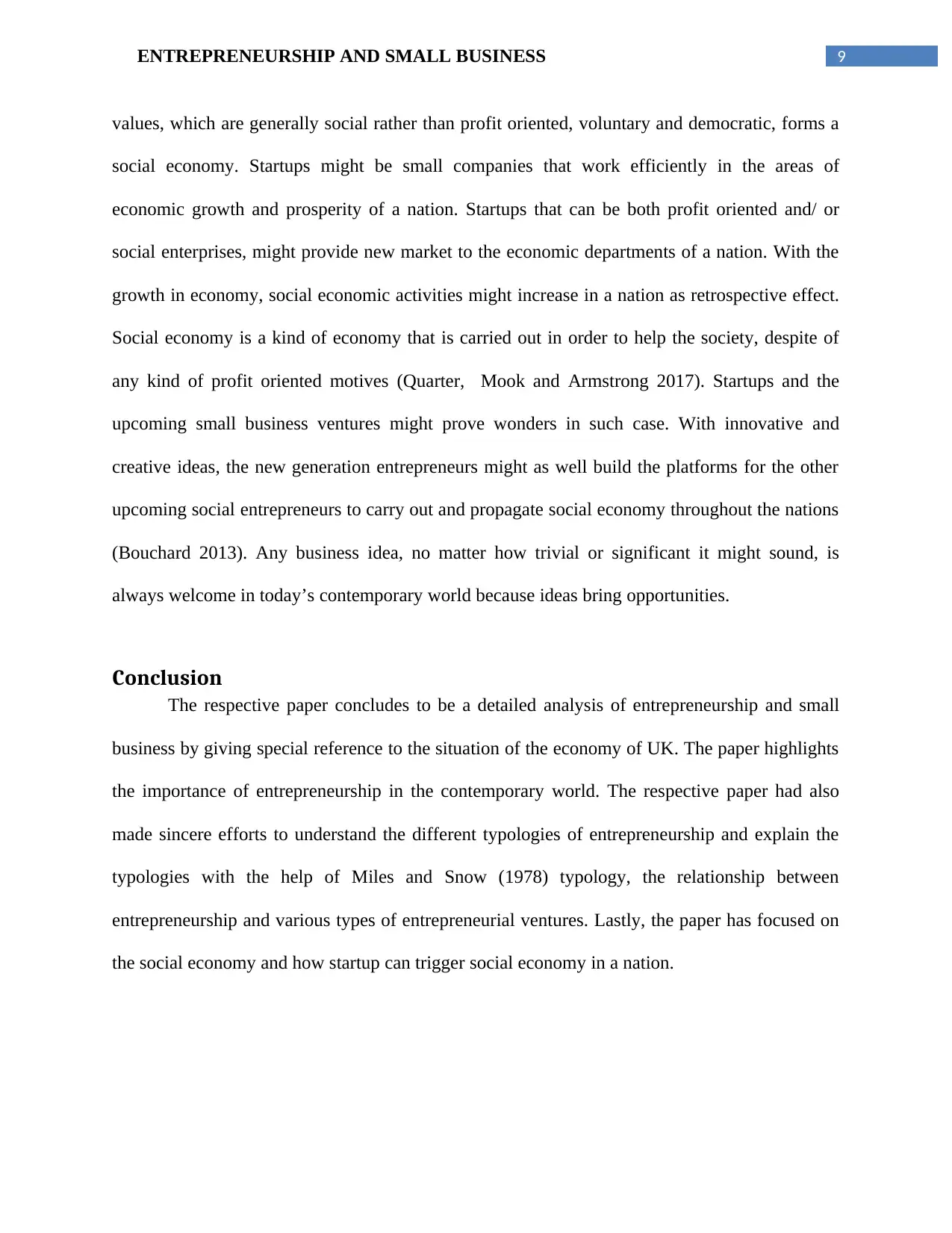
9ENTREPRENEURSHIP AND SMALL BUSINESS
values, which are generally social rather than profit oriented, voluntary and democratic, forms a
social economy. Startups might be small companies that work efficiently in the areas of
economic growth and prosperity of a nation. Startups that can be both profit oriented and/ or
social enterprises, might provide new market to the economic departments of a nation. With the
growth in economy, social economic activities might increase in a nation as retrospective effect.
Social economy is a kind of economy that is carried out in order to help the society, despite of
any kind of profit oriented motives (Quarter, Mook and Armstrong 2017). Startups and the
upcoming small business ventures might prove wonders in such case. With innovative and
creative ideas, the new generation entrepreneurs might as well build the platforms for the other
upcoming social entrepreneurs to carry out and propagate social economy throughout the nations
(Bouchard 2013). Any business idea, no matter how trivial or significant it might sound, is
always welcome in today’s contemporary world because ideas bring opportunities.
Conclusion
The respective paper concludes to be a detailed analysis of entrepreneurship and small
business by giving special reference to the situation of the economy of UK. The paper highlights
the importance of entrepreneurship in the contemporary world. The respective paper had also
made sincere efforts to understand the different typologies of entrepreneurship and explain the
typologies with the help of Miles and Snow (1978) typology, the relationship between
entrepreneurship and various types of entrepreneurial ventures. Lastly, the paper has focused on
the social economy and how startup can trigger social economy in a nation.
values, which are generally social rather than profit oriented, voluntary and democratic, forms a
social economy. Startups might be small companies that work efficiently in the areas of
economic growth and prosperity of a nation. Startups that can be both profit oriented and/ or
social enterprises, might provide new market to the economic departments of a nation. With the
growth in economy, social economic activities might increase in a nation as retrospective effect.
Social economy is a kind of economy that is carried out in order to help the society, despite of
any kind of profit oriented motives (Quarter, Mook and Armstrong 2017). Startups and the
upcoming small business ventures might prove wonders in such case. With innovative and
creative ideas, the new generation entrepreneurs might as well build the platforms for the other
upcoming social entrepreneurs to carry out and propagate social economy throughout the nations
(Bouchard 2013). Any business idea, no matter how trivial or significant it might sound, is
always welcome in today’s contemporary world because ideas bring opportunities.
Conclusion
The respective paper concludes to be a detailed analysis of entrepreneurship and small
business by giving special reference to the situation of the economy of UK. The paper highlights
the importance of entrepreneurship in the contemporary world. The respective paper had also
made sincere efforts to understand the different typologies of entrepreneurship and explain the
typologies with the help of Miles and Snow (1978) typology, the relationship between
entrepreneurship and various types of entrepreneurial ventures. Lastly, the paper has focused on
the social economy and how startup can trigger social economy in a nation.
Secure Best Marks with AI Grader
Need help grading? Try our AI Grader for instant feedback on your assignments.
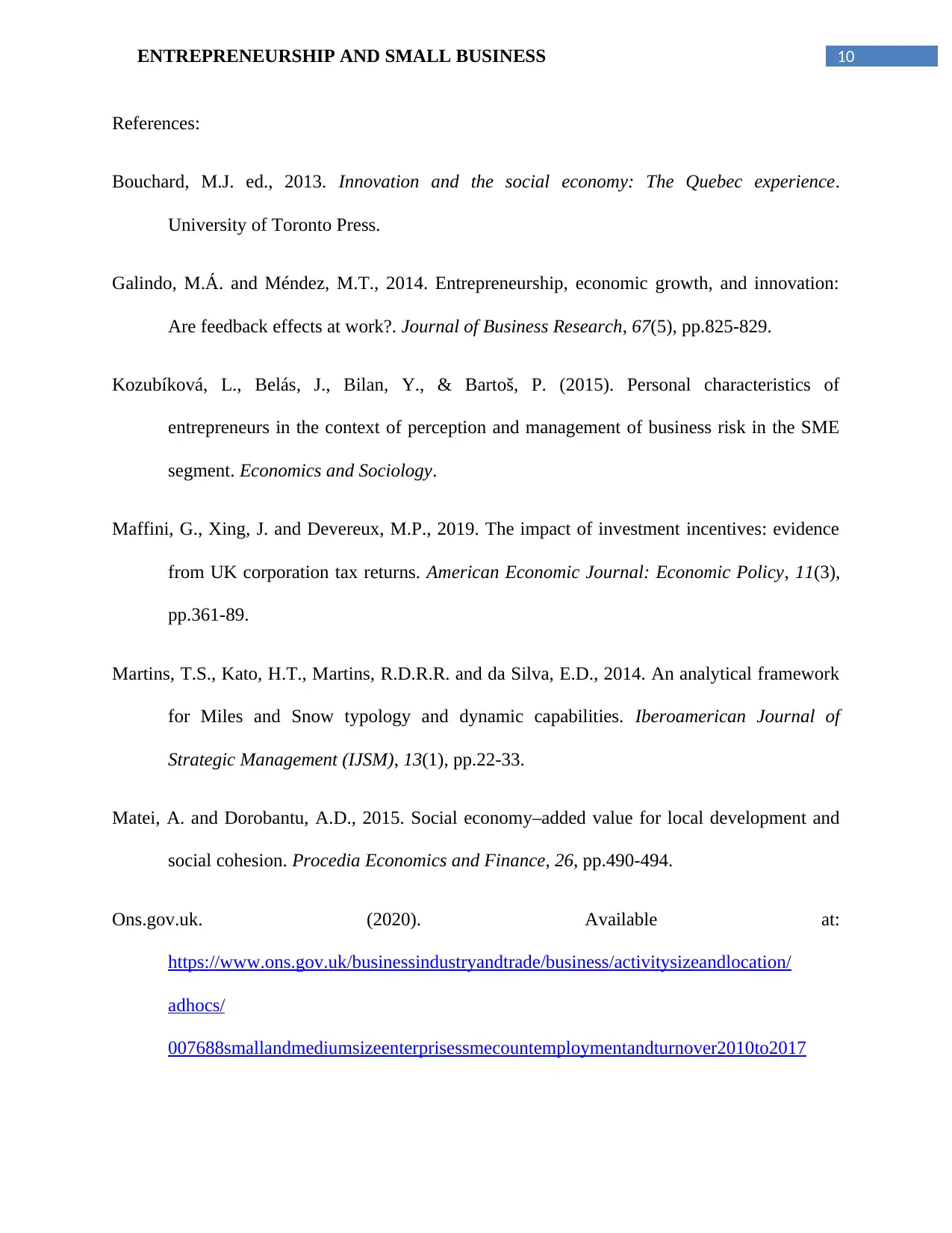
10ENTREPRENEURSHIP AND SMALL BUSINESS
References:
Bouchard, M.J. ed., 2013. Innovation and the social economy: The Quebec experience.
University of Toronto Press.
Galindo, M.Á. and Méndez, M.T., 2014. Entrepreneurship, economic growth, and innovation:
Are feedback effects at work?. Journal of Business Research, 67(5), pp.825-829.
Kozubíková, L., Belás, J., Bilan, Y., & Bartoš, P. (2015). Personal characteristics of
entrepreneurs in the context of perception and management of business risk in the SME
segment. Economics and Sociology.
Maffini, G., Xing, J. and Devereux, M.P., 2019. The impact of investment incentives: evidence
from UK corporation tax returns. American Economic Journal: Economic Policy, 11(3),
pp.361-89.
Martins, T.S., Kato, H.T., Martins, R.D.R.R. and da Silva, E.D., 2014. An analytical framework
for Miles and Snow typology and dynamic capabilities. Iberoamerican Journal of
Strategic Management (IJSM), 13(1), pp.22-33.
Matei, A. and Dorobantu, A.D., 2015. Social economy–added value for local development and
social cohesion. Procedia Economics and Finance, 26, pp.490-494.
Ons.gov.uk. (2020). Available at:
https://www.ons.gov.uk/businessindustryandtrade/business/activitysizeandlocation/
adhocs/
007688smallandmediumsizeenterprisessmecountemploymentandturnover2010to2017
References:
Bouchard, M.J. ed., 2013. Innovation and the social economy: The Quebec experience.
University of Toronto Press.
Galindo, M.Á. and Méndez, M.T., 2014. Entrepreneurship, economic growth, and innovation:
Are feedback effects at work?. Journal of Business Research, 67(5), pp.825-829.
Kozubíková, L., Belás, J., Bilan, Y., & Bartoš, P. (2015). Personal characteristics of
entrepreneurs in the context of perception and management of business risk in the SME
segment. Economics and Sociology.
Maffini, G., Xing, J. and Devereux, M.P., 2019. The impact of investment incentives: evidence
from UK corporation tax returns. American Economic Journal: Economic Policy, 11(3),
pp.361-89.
Martins, T.S., Kato, H.T., Martins, R.D.R.R. and da Silva, E.D., 2014. An analytical framework
for Miles and Snow typology and dynamic capabilities. Iberoamerican Journal of
Strategic Management (IJSM), 13(1), pp.22-33.
Matei, A. and Dorobantu, A.D., 2015. Social economy–added value for local development and
social cohesion. Procedia Economics and Finance, 26, pp.490-494.
Ons.gov.uk. (2020). Available at:
https://www.ons.gov.uk/businessindustryandtrade/business/activitysizeandlocation/
adhocs/
007688smallandmediumsizeenterprisessmecountemploymentandturnover2010to2017
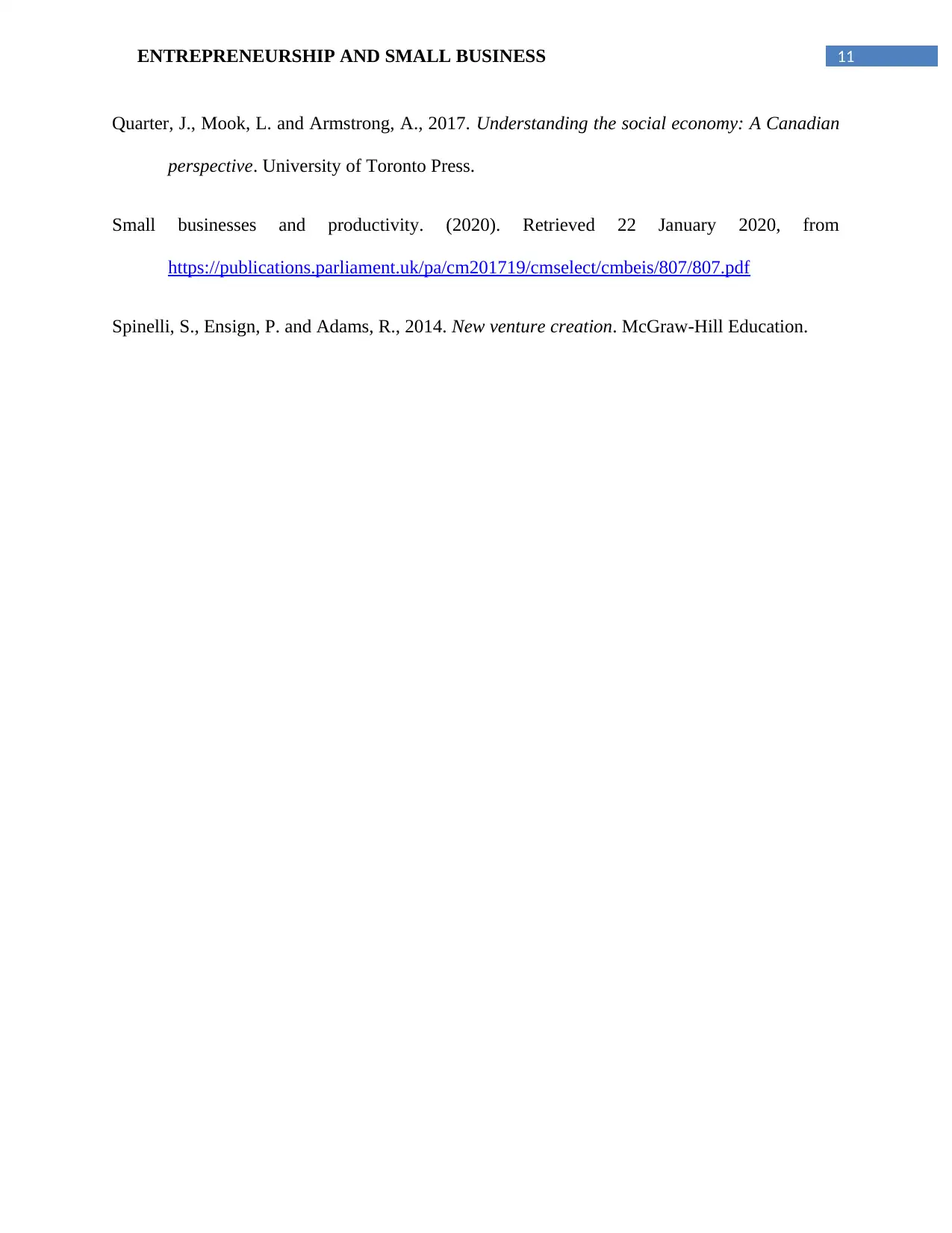
11ENTREPRENEURSHIP AND SMALL BUSINESS
Quarter, J., Mook, L. and Armstrong, A., 2017. Understanding the social economy: A Canadian
perspective. University of Toronto Press.
Small businesses and productivity. (2020). Retrieved 22 January 2020, from
https://publications.parliament.uk/pa/cm201719/cmselect/cmbeis/807/807.pdf
Spinelli, S., Ensign, P. and Adams, R., 2014. New venture creation. McGraw-Hill Education.
Quarter, J., Mook, L. and Armstrong, A., 2017. Understanding the social economy: A Canadian
perspective. University of Toronto Press.
Small businesses and productivity. (2020). Retrieved 22 January 2020, from
https://publications.parliament.uk/pa/cm201719/cmselect/cmbeis/807/807.pdf
Spinelli, S., Ensign, P. and Adams, R., 2014. New venture creation. McGraw-Hill Education.
1 out of 12
Related Documents
Your All-in-One AI-Powered Toolkit for Academic Success.
+13062052269
info@desklib.com
Available 24*7 on WhatsApp / Email
![[object Object]](/_next/static/media/star-bottom.7253800d.svg)
Unlock your academic potential
© 2024 | Zucol Services PVT LTD | All rights reserved.





